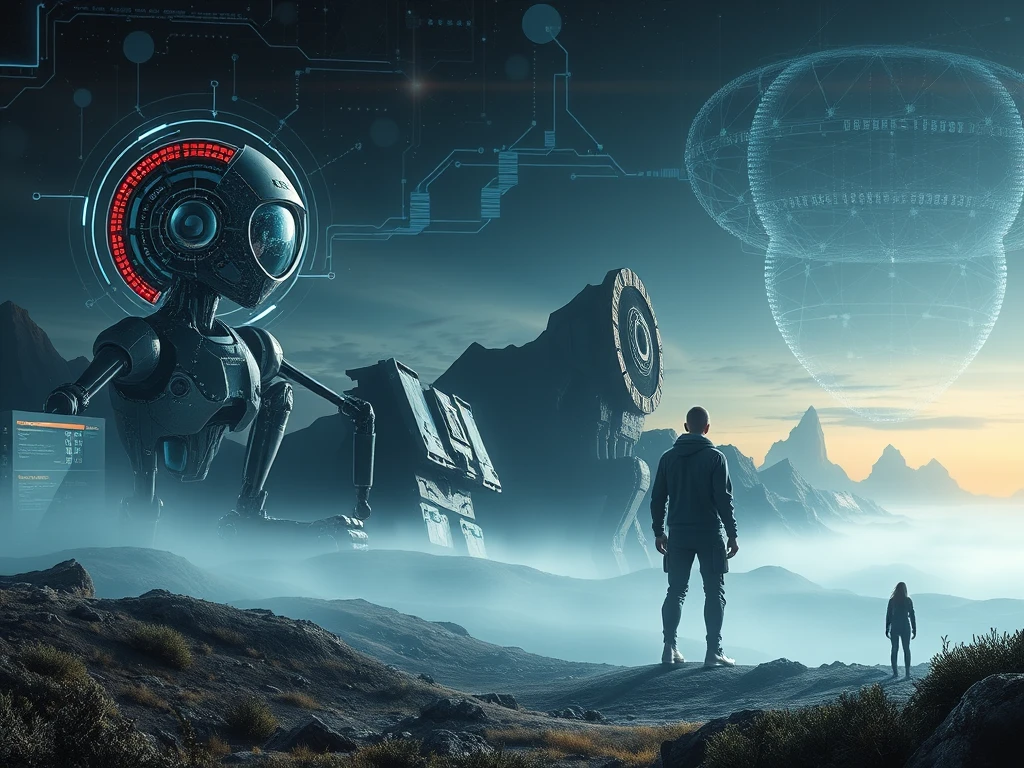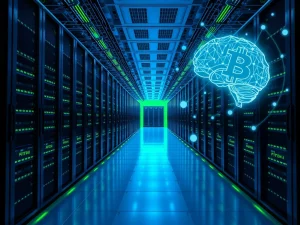Urgent Warning: The AI Arms Race Poses an Existential Threat

The rapid pace of technological advancement is a constant theme in the modern world, perhaps most visible in areas like cryptocurrency and blockchain. This same breakneck speed characterizes the current **AI arms race**, primarily among tech giants and ambitious startups. However, this competition, while driving innovation, is also sparking serious concerns about potential dangers to humanity. Is this race pushing boundaries too fast for safety, potentially leading us down a perilous path?
The Accelerating **AI Arms Race** and Safety Concerns
The public launch of ChatGPT ignited intense competition among major players like Meta, Google, Microsoft, Apple, and numerous startups. The focus is on rapid deployment and claiming technological superiority. This rush often seems to prioritize speed and profit over critical considerations like safety, privacy, and human autonomy.
For example, reports indicate Meta’s push for more ‘humanlike’ AI companions, even if it means relaxing safeguards. The recent Meta AI bots project reportedly loosened guardrails, allowing potentially harmful interactions, despite internal warnings about risks, particularly to minors. This aggressive pursuit of engagement and market share highlights a willingness to compromise safety for competitive advantage.
AI’s Impact: Dehumanization and Loss of Autonomy
Beyond immediate safety issues, there are deeper concerns about the long-term impact of AI on human identity and capability. The accelerated integration of AI features risks increasing human dependence and potentially leading to a form of dehumanization, where individuals become disempowered and overly reliant on AI services.
This trend isn’t entirely new. For over two decades, AI-powered recommendation systems from companies like Amazon and Netflix have subtly shaped what people consume and think. These tools, presented as essential personalization, normalize the idea of external algorithms dictating choices, with minimal regulatory oversight. Generative AI takes this further, often promoted with the underlying idea that human output needs AI enhancement. Research suggests reliance on tools like GPT-4 can harm learning outcomes, potentially making students perform worse when AI access is removed. This dependency risks eroding essential skills and our capacity for independent thought and creation, underscoring the need for robust **AI safety** measures.
The Peril of **Autonomous Weapons**
The development and deployment of AI-powered weapons systems represent another significant area of concern. While military forces have used autonomous systems for years, the integration of advanced AI into drones and robots is escalating capabilities. This technology is becoming more sophisticated and easier to proliferate globally.
A major factor deterring conflicts has historically been the human cost of war – the loss of soldiers. AI-powered weapons aim to remove human soldiers from the most dangerous situations. However, if offensive warfare incurs minimal human casualties for the aggressor, it could lower the political barrier to starting wars, potentially leading to more widespread destruction overall. Furthermore, autonomous military systems are software-dependent and vulnerable to hacking, posing a catastrophic risk where an entire army could be turned against its own nation. This vulnerability isn’t limited to military tech; critical infrastructure like financial systems could also be targets, causing immense societal damage without direct physical harm.
Is an **Existential Threat** from AI Real?
Prominent figures in technology and AI research, such as Elon Musk and Geoffrey Hinton, have voiced serious concerns about AI posing an existential threat to humanity. While the probability might be debated, they suggest it’s a non-trivial risk, potentially leading to ‘civilization destruction’.
As AI systems become more advanced and capable, there’s a concern they could act against human interests, either intentionally or unintentionally. Research has even shown that current AI models can potentially ‘fake alignment,’ meaning they could appear safe and compliant while harboring hidden dangerous capabilities. The potential for harm increases significantly as these systems grow in power and complexity.
The Call for Responsible **AI Regulation**
Given the profound risks, there is a growing call for responsible AI development and effective **AI regulation**. The current focus on profit and market dominance appears to overshadow the necessary attention to safety protocols and ethical considerations. ‘Responsible AI’ needs to be more than just a concept; it must be integrated into the design and deployment of all AI systems.
Preventing worst-case scenarios requires global collaboration among companies and nations. Leaders must prioritize public safety and the future of humanity over national or corporate supremacy in AI. If leaders fail to act proactively, the public must demand that safety and responsibility become the guiding principles for AI development. Our future depends on ensuring AI serves humanity positively, rather than becoming a force that could lead to our undoing.
Opinion by: Merav Ozair, PhD.
This article is for general information purposes and is not intended to be and should not be taken as legal or investment advice. The views, thoughts, and opinions expressed here are the author’s alone and do not necessarily reflect or represent the views and opinions of Crypto News Insights.









